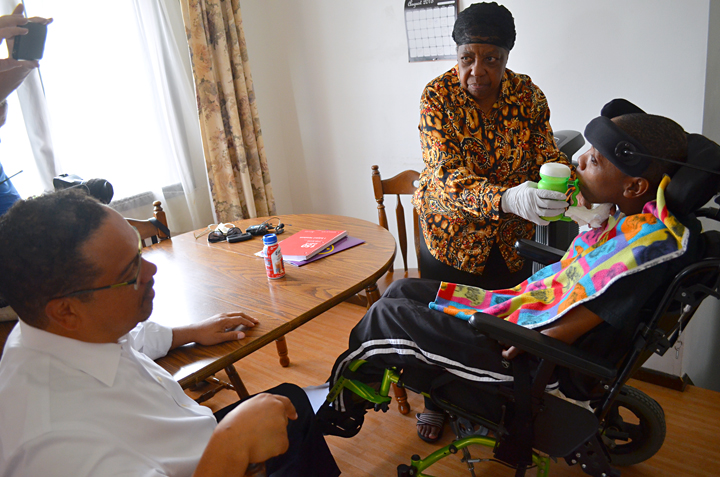

Share
Clara Nakumbe is fighting for $15 an hour, but the Minneapolis resident doesn’t work in a fast-food restaurant or behind the scenes at the airport. She works in her own home, providing round-the-clock care for her son Siran, who lives with a severe form of multiple sclerosis.
It’s work that earns Nakumbe $11 per hour, thanks to a new contract between the State of Minnesota and home care workers, members of SEIU Healthcare Minnesota, that went into effect this summer.
Nakumbe was an early supporter of the union drive that led to that historic first contract. Now, she’s among a growing number of home care workers nationwide raising their voices as part of the “Fight for $15.”
“Just because we’re doing this doesn’t mean we don’t have bills,” Nakumbe told U.S. Rep. Keith Ellison during a visit at her kitchen table today. “People need decent wages because they still have responsibilities.”
Ellison, a DFLer from Minnesota’s 5th Congressional District, visited Nakumbe’s north Minneapolis home as part of an event organized by SEIU to expose lawmakers to the challenges home care workers face on a daily basis.
He asked several questions of Clara, Siran’s brother Shmel Bogan and Siran himself, who could offer only “yes” or “no” as answers. The conversation ranged from Siran’s life before his diagnosis to the family’s daily routine.
“What do you think about the home care workers getting $15 an hour?” Ellison asked Siran.
“He said yes!” Clara laughed.
Although Social Security benefits help, Nakumbe said her income remains far below what she was earning at the job she left in order to keep Siran out of a nursing home – a decision that not only keeps Siran close to family, but saves the state money as well. She said she supports the Fight for $15 movement for the same reasons she supported the union drive four years ago.
“We fought for the union in order to have a voice,” she said. “If more of us come together collectively, we can do more than we can individually.”
Ellison said seeing home care work firsthand reinforced his belief that both home care workers and clients deserve better than wages that keep workers at or below the poverty line.
“If we pay this work fairly, it means we value all members of our community,” Ellison said. “We’re all one injury or one illness away from needing the care you all provide for Siran.
“If his home care worker is paid the right way, then he’ll be taken care of properly. But if you’re paying (home care workers) not even enough to stay out of poverty, how can you expect them to continue to do the work?”

